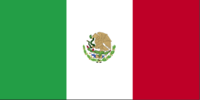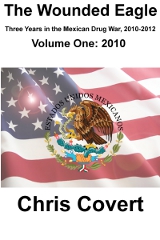Mexican bishop says Tarahumara Indians grow drugs to survive

2012-02-06
Posted by: badanov
For a map click here
By Chris Covert
The Catholic bishop of the Tarahmara, Chihuahua diocese Saturday said the indigenous Tarahumara Indians are resorting to growing drugs to survive, according to Mexican news accounts.
Bishop Rafael Sandoval Sandoval told fellow Catholics at a missionary conference in Puebla state that while no justification exists for growing drugs, the Indians are left with no alternative.
| But "no alternative" is a justification. I feel dizzy. |
But many of the Tarahumara Indians are subsistence farmers, and therefore do not receive a check from the government when crops fail. They simply starve. El Sol de Mexico news daily reported Friday that 80 percent of farming in the Tarahumara Sierras is for consumption, and not for sale.
A news report Friday said that 29 of 33 political entities are experiencing some effect of the drought, while, according to the Mexican leftist weekly Proceso, 1,213 municipalities in 19 states have been affected by the drought, mostly in the states of Chihuahua, Durango, San Luis Potosi and Zacatecas.
Those states are all in the northern and north central regions of Mexico around the Sierras.
Reports are being filed in Mexican press about how the problem is growing. For example in Veracruz, an Organizacion Editorial Mexicano news report said that 800 head of cattle in the last two weeks in Veracruz state have died from dehydration and complications from malnourishment. Temperatures there have been as high as 98 degrees Fahrenheit in the coastal areas of the state.
Milk sales are also down partially because of a perception amongst local consumers that milk being sold is contaminated. Milk prices due to the shortage are much higher, and are a likely culprit in local consumer's reluctance to buy.
Mexican politicians are responding with typically great fanfare. For example, Durango state Governor Jorge Herrera Caldera told Mexican press Saturday that he and his wife help deliver aid to several Durango municipalities affected by the drought including Luz y Esperanza, Morga, Mendez Arceo, Ampliacion Rosas and Luz del Carme.
Governor Herrera Caldera dubbed aid deliveries as Una Gota de Ayuda por Durango or A Drop of Aid to Durango.
The governor also granted titles of houses to 350 families in the region.
The Sierras in Durango are part of what has been dubbed Mexico's Golden Triangle of states where drugs are grown and where some communities are in thrall to drug production. The uneasy nexus between local indigenous farmers and local cartel gangs and their affiliates has erupted over the last two years as drug cartels have imposed penalties on those communities including destruction of whole blocks of homes by arson.
Last week two homes were torched in Mezquital in far southern Durango. And Mezquital has seen drug cartel violence visited on them before, in March 2011; when 10 buildings were torched.
To read the Rantburg report on drug cartel governance in the Mexican Sierras, click here and here and follow the links.
Thursday morning Mexican president Felipe Calderon Hinojosa and his Secretaria de Defensa Nacional (SEDENA), General Guillermo Galvan Galvan escorted aid deliveries to the Chihuahua Sierras. That visit included President Calderon sporting a military cap while wearing a white short with sleeves rolled up, and photo ops for the press.
Heriberto Felix Guerra, head of Mexico's Secretaria de Desarrollo Social (SEDESOL), or Secretary of Social Development told the press Friday that 650 individuals and 140 vehicles -- including helicopters -- from several federal government agencies are "working full time" to oversee aid deliveries to the Sierra Tarahumara region of Mexico.
Feliz Guerra also said his agency will leave the region when he is certain no one is hungry or thirsty.
Partido Revolucion Democratica junior senator Armando Contreras Castillo from Oaxaca state has urged politicians in Mexico City not to politicize the crisis. Armando Contreras Castillo termed the food shortage and drought as a "structural famine."
An APRO -- the wire service for Proceso -- article published Sunday in El Diario de Coahuila news daily tells another side.
According to the article, aid deliveries to date have been very spotty and inefficient. Stories abound in the region of workers selling aid packages for cash. Additionally, Chihuahua state government has slashed its budget for the Tarahumara Sierra region by 24 percent, which is probably a prudent reaction to lower tax revenues due to the drought and crop failures.
The crises brings its own problems other than starvation. A health crisis has begun with an epidemic of hepatitis and scabies among children, mainly due to the shortage of water, among other problems associated with starvation.
Proceso also charges that were it not for the claim by local indigenous peasant leader Ramon Gardea last January that 50 Tarahumara Indians had committed suicide, the government would have never reacted to the crisis as soon as it did.
The charge Gardea uttered in an independent television interview apparently put all three levels of government on notice that a crisis was developing into a calamity.
Proceso also said that farmers and their organizations have been practically screaming for aid since the spring of 2011.



